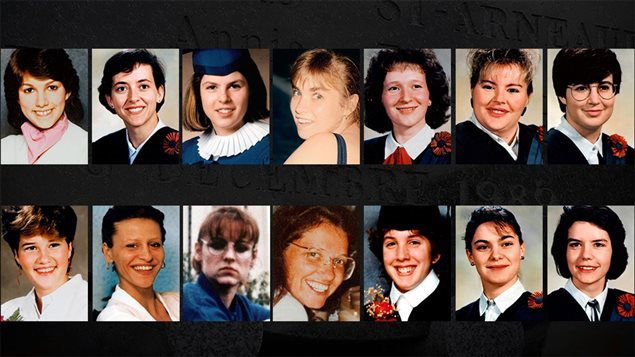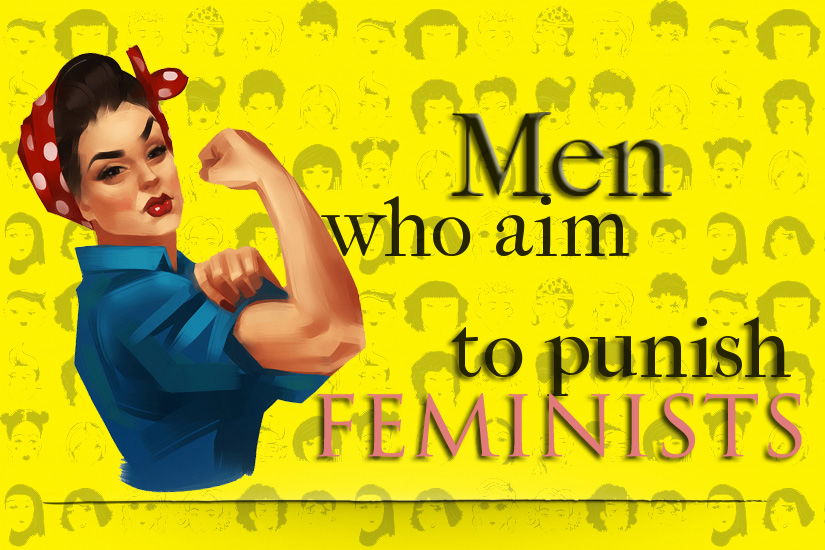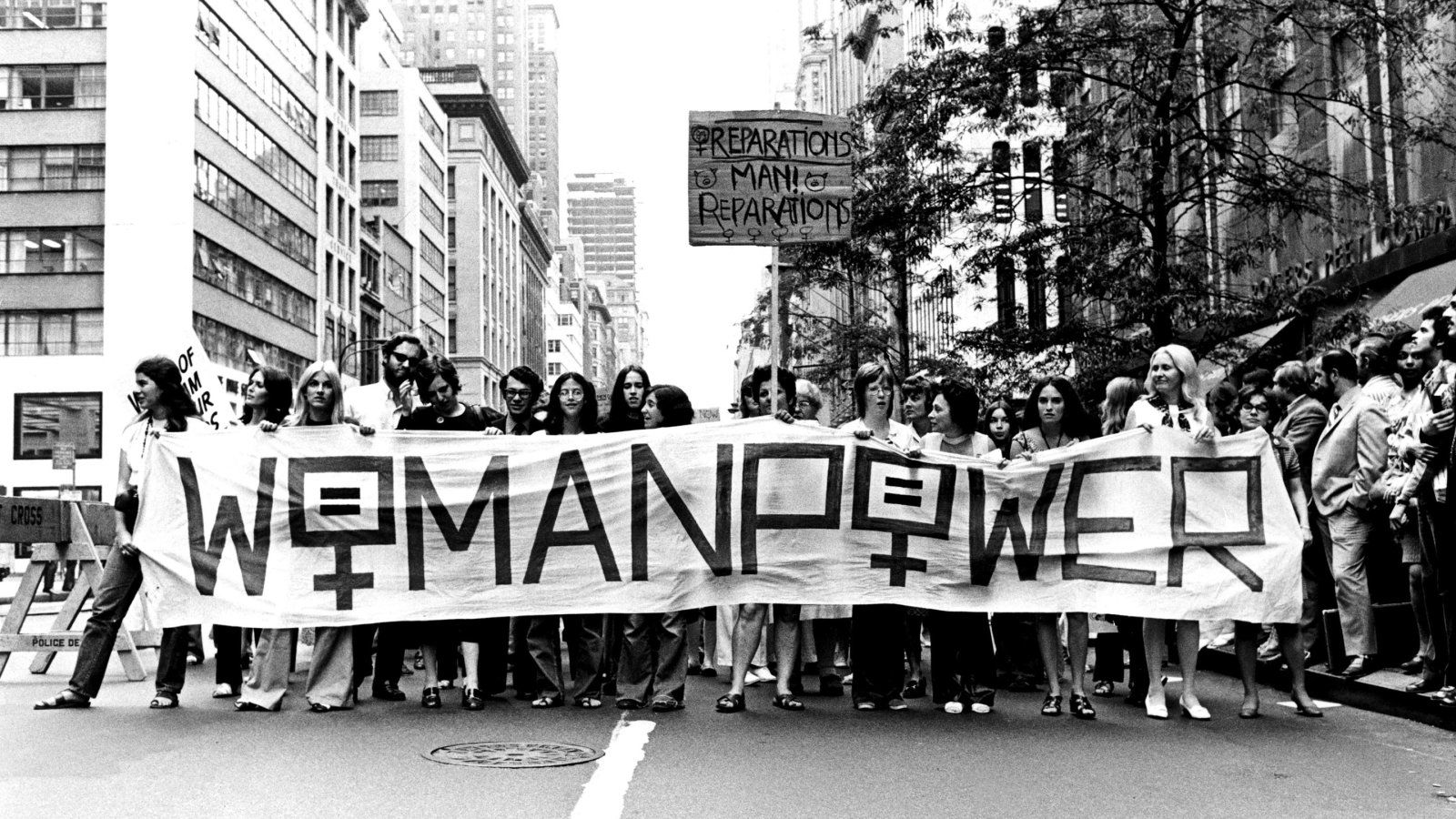On December 6th, 1989, 25-year-old Marc Lépine broke into a mechanical engineering class at
Université de Montréal's École Polytechnique brandishing an automatic weapon. He separated the students into two groups, with men on one side and women on the other. He ordered the men to leave and then fired point blank on the nine women, screaming, “You’re all a bunch of feminists! I hate feminists!” Six of the women were killed and three were injured. He continued his violent rampage into the corridors, targeting more women until he ran out of ammunition and committed suicide. The attack lasted about 20 minutes.

Photos of all 14 women shot to death on Dec. 6, 1989.
In all, 14 young women were murdered and 14 other people were wounded (including 10 women and 4 men affiliated with the University). This horrible event is labelled in history as the ‘Montreal Massacre’ and is commemorated in respect to the brave martyrs who lost their lives at the hands of a serial killer.
His suicide note blamed Feminists for ruining his life and included a list of 19 ‘radical feminists’ that he said he would have killed if he had the time. In the weeks and months following the tragedy, the media interviewed various experts who presented Lépine’s attack as an isolated act with no particular social significance. Little attention was paid to feminist experts on male violence. It is understood that Lépine lacked ambiguity and did not have the quality of being open to more than just his own understanding when it came to his motive. Might I also add as a quick fact which is important to acknowledge, Feminism is a section of study in Sociology which we refer to as being a conflict theory. Feminism is a theoretical perspective which observes gender in its relation to power, and talks about roles which are socially constructed and reinforced on both women and also men. It focuses on sexual orientation, race, economic status, and nationality. Feminists are open to more than just one perspective and the systematic study of it concludes that this topic is studied both within social structures at large or at the macro level and also at the micro level meaning face-to-face interaction. However, when the story is retold, the word ‘woman’ is often used as a heading or a subtitle for the word ‘feminist’ with twists of phrase such as ‘he was hunting down women’.
Photos taken on the scene of the crime that occurred on December 6, 1989.


When commenting on this tragic event which took the lives of fourteen women, a woman claimed that Feminists are not identifying themselves as Feminists and that it could somehow be linked to what may have been going on in head. I would like to address that in this post. Individuals tend to have different elements of choice in which they choose to identify with (of course, as long as it is under the cultural framework of that society) and once they choose their preferred group, they adopt the identity that is synonymous with the group. This is referred to as a collective identity. Moreover, a Feminist or an equal rights activist who campaigns about the growing inequalities found in many countries across the world and is concerned with the persisting forms of harassment which continue to take place to this very day, is truly an element of their ‘active’ choice of identity which they can relate to. In this case, a Feminist may present her feminist identity through for example, a t-shirt which symbolizes Feminism or perhaps a quote on the t-shirt that is considered to be a Feminist quote. A Feminist may be able to show that through her-or his preferences and responses to different topics and situations. Over and above that, she-or he may show it through behavior and attitudes which come with adopting the identity chosen by the individual, therefore it becomes something which they personify.

A Quebec journalist, Francine Pelletier, whose name was also on Lépine’s list, says ‘’There’s a difference between saying that it is a crime against women and saying it is a crime against women who are trying to change how society works. It’s beating up on women because they’re rattling the cage.’’ It certainly isn’t new to people’s ears that the dominant ideology of society has taken for granted many things including gender inequality and quotes like ‘’Well-behaved women seldom make history’’, which are considered to be Feminist quotes, begin to make a lot of sense to a lot of people! Conceivably, a good example of this is Countess Marie-Catherine D’Aulnoy in 1697 who was the first to coin the term ‘fairytale’. The Grimm brothers, however, are known by almost everybody and many people assume they were the ones who came up with the term which is now generally used for the genre.
Unsurprisingly, many of these men indulge in misogynist fantasies in which they punish women for not sleeping with them or participating in sexual acts they want. And, in some cases, like Minassian’s case, where he drove a van onto a crowded Toronto sidewalk and killed 10 people shortly after creating a post on Facebook saying ‘’The ‘incel Rebellion’ has begun’’. Those fantasies result into real-world violence. Minassian’s rampage was inspired by his rage because he didn’t have unlimited access to women’s bodies.
Neither Lépine nor Minassian were ambiguous about their set motives, and yet, up to this present time we still struggle with referring to crimes like theirs to what they truly are, that is, violence against women asserting themselves as equals in public and private places, violence on women who demand control over their bodies, and violence against women who want to share the same education and career opportunities as men.
Lépine’s actions are, as Pelletier describes, a crime against the future simply because he aimed to destroy the chances and idea that women may one day attain social cohesion and economic equality. He was described as someone who had difficulty in relating to members of the opposite sex, and when he tried joining the military, he was rejected for being antisocial. What both Lépine and Minassian did had a strong sense of intention and that purpose was an act of terrorism which is terrorizing women back to what has for so long been considered as their ‘rightful place’ in society.
The way of describing the horrible acts done by Lépine at the École Polytechnique as ‘‘violence against women’’ does not resonate well with me, even if it goes along the broader content of gender-based violence, it does not change the fact that the term ‘Feminist’ was replaced by the word ‘women’ which, as many of you all know by now, does not mean ‘women’ and doesn’t always refer to women.
As the years continue to pass by, Feminists are still faced with harassment. They are stalked, attacked, tormented and embarrassed frequently in many social situations. It is a persistent issue that is largest online, where people have gone to comparing it to a terminal illness and even creating hashtags of the incident.
In conclusion to all, we know very well that we cannot stand up and fight violence that isn’t even addressed appropriately, in reality a persisting issue which isn’t even addressed at all in my opinion. Because there are people out there who, just like Lépine and Minassian, are targeting and hunting down Feminists and honestly couldn’t care less what we say. There is no salvation in trying to pacify those men who see us women as belonging to a place which is beneath their own. If we all stand united, we can surely break through and that is exactly what we intend to do. If that’s what it takes, bring it on.









